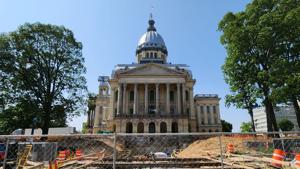(The Center Square) – Possible enhancements to Illinois’ pension system could “materially increase the state’s pension challenges and affect Illinois’ credit rating,” according to Fitch Ratings.
Illinois has among the highest unfunded pension liabilities in the U.S. at about $140 billion. For months, discussions have been ongoing at the Illinois Statehouse about the state’s Tier 2 pension benefits for employees hired after 2011 who receive fewer benefits, with some suggesting the Tier 2 benefits need to be enhanced to attract and retain public employees, but also to meet IRS “safe harbor” standards that require pensions to be an adequate replacement for Social Security benefits. Many Illinois state workers do not qualify for Social Security benefits – or pay for them – because of the pension systems.
“We had extensive subject matter hearings regarding safe harbor last summer and there were examples from both the Teacher Retirement System and State University Retirement System of individuals that would trigger safe harbor,” state Rep. Stephanie Kifowit, D-Oswego, told The Center Square in April.
Fitch said such policy changes impacting adequacy seem “unlikely to affect Illinois’ credit quality.”
“Other proposals aimed at more broadly enhancing Tier 2 pension benefits, including eliminating the distinction between Tier 1 and Tier 2, could materially increase the state’s pension challenges and affect Illinois’ credit rating,” Fitch said Thursday.
Illinois has among the worst credit ratings in the country despite recent upgrades and Moody’s Investors Service revising the state’s outlook from “stable” to “positive.”
“We’ve had nine consecutive credit upgrades and we want to keep going,” said Illinois Comptroller Susana Mendoza. “Better ratings from the bond rating agencies mean lower costs for Illinois taxpayers on infrastructure projects like roads and bridges.”
Local governments in Illinois face similar financial challenges if the state enhances Tier 2 benefits for public employees, Fitch said, and have been studying and addressing this issue as well.
“If Tier 2 does not meet safe harbor requirements, the state risks paying (and requiring employees to pay) FICA taxes, likely at significant expense,” Fitch said. “Proposals that simply raise the pensionable earnings cap will likely result in modest increases in the pension liability and budgetary demands.”
Gov. J.B. Pritzker’s proposed fiscal year 2025 budget suggests the state’s pension boards and the General Assembly consider raising the Tier 2 pensionable earning cap.
“Total cumulative annual contributions from 2023 to 2045 would rise $5.6 billion, or 1.7%, if the state raised the Tier 2 earnings cap,” Fitch said. “This level of changes would not shift Fitch’s perspective on the credit implications of the state’s long-term liability burden or high carrying costs.”
However, Fitch said other proposals that would more broadly enhance Tier 2 benefits, potentially to Tier 1 levels, could “negatively affect the state’s credit rating or limit the potential for future positive rating action.”
State Rep. Blaine Wilhour, R-Beecher City, warned taxpayers of any enhancements.
“I suspected at the time [the conversation] would transform into a massive pension enhancement the taxpayers simply can’t afford,” Wilhour told The Center Square in April. “We passed through the pensions committee a couple bills that are going to put billions of dollars onto the taxpayer when property taxes are already out of control. Let’s be honest about the conversation we are having. Are we trying to fix the Tier 2 system or are we trying to do a massive pension enhancement?”





